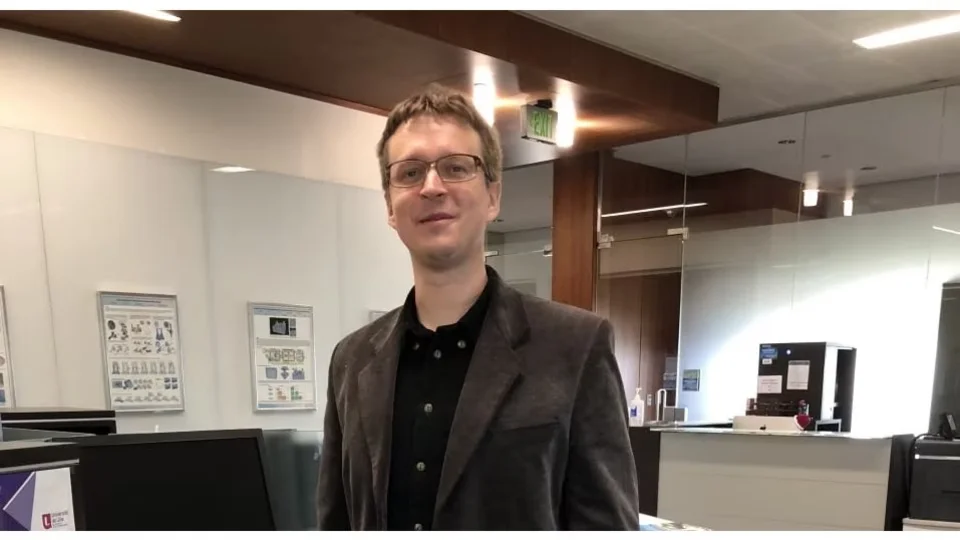
Dominik L. Michels
- Associate Professor, Computer Science
- Principal Investigator, Computational Sciences Group
Professor Michels is a leading computer scientist who proactively designs strategies to face upcoming digitization challenges. His outstanding research has been recognized by the scientific community within and beyond KAUST.
Biography
Before founding the Computational Sciences Group (CSG) at KAUST, Professor Michels joined the Computer Science Department at Stanford University, U.S., after completing his postdoctoral studies at Caltech, U.S., and his B.Sc. ('11), M.Sc. ('13), and Ph.D. ('14) at the University of Bonn, Germany.
Since joining KAUST in 2016, he has established his group at the uppermost level of his scientific community. Since its formation, the CSG has developed numerous novel computational methods based on solid theoretical foundations.
The scientific community has recognized Professor Michels’ outstanding research within and beyond KAUST. In 2019, he was awarded a €1.25 million Artificial Intelligence Grant from the German State of North Rhine-Westphalia, Germany. Together with fellow KAUST Professors Mark Tester and Peter Wonka, he received a $1.05 million KAUST Competitive Research Grant in 2021. Moreover, in 2017, he was acknowledged by Procter & Gamble with their inaugural Faculty Award for his research contributions to the consumer goods industry.
Professor Michels is actively engaged in the Association for Computing Machinery (ACM) SIGGRAPH community; he served on the technical paper committees of SIGGRAPH 2022 and 2023, and SIGGRAPH Asia 2020 and 2021.
Michels is a member of the Association for Computing Machinery, the Institute of Electrical and Electronics Engineers, the London Mathematical Society and the AGYA project at the Berlin-Brandenburg Academy of Sciences and Humanities. He is a founding member of the German AI Award top-class jury.
As an alumnus of the German Academic Scholarship Foundation, Michels leads its KAUST partnership program. He was recently inaugurated into the Göttingen Academy of Sciences and Humanities and has been listed among the German business magazine Capital's "Top 40 below 40."
Research Interests
As the head of KAUST's CSG, Michels’ research activities focus on fundamental and applied aspects of computational mathematics and physics to overcome practical problems in scientific and visual computing.
At present, the group addresses a broad range of topics related to algorithmics, artificial intelligence, machine learning, computer graphics, physics-based modeling, differential equations, mathematical modeling and numerical analysis.
Awards and Distinctions
- ACM SIGSAM Award, 2024
- AFCEA Academic Award, 2024
- Distinguished Dissertation, University of Bonn (German Informatics Society Colloquium), 2024
- Elected Member of AGYA, Berlin-Brandenburg Academy of Sciences and Humanities, 2024
- KAUST Competitive Research Grant, 2024
- NRW Artificial Intelligence Grant, 2024
- Procter & Gamble Faculty Award, 2024
- Scholar, Bonn University Foundation, 2024
- Scholar, German National Merit Foundation, 2024
- Scholar / Participant, Heidelberg Laureate Forum, 2024
- Scholar, Johannes Kepler Foundation, 2024
- Scholar, Max Planck Society for the Advancement of Science, 2024
- Scholar, State of North Rhine-Westphalia, 2024
Education
- Doctor of Philosophy (Ph.D.)
- Mathematics and Natural Sciences, University of Bonn, Germany, 2014
- Master of Science (M.S.)
- Computer Science, University of Bonn, Germany, 2013
- Bachelor of Science (B.S.)
- Computer Science and Physics, University of Bonn, Germany, 2011
Quote
Our primary objective is the investigation and development of efficient algorithms for the accurate simulation of natural phenomena, processes, and technical procedures to solve relevant problems in scientific and visual computing.
Questions and Answers
Why KAUST?
KAUST is one of just a very few universities that have the potential to create tremendous global impact in science and society. It initiates educational, economic and social change in the region, and from a purely scientific perspective, addresses current global challenges, including energy and environmental issues.
Why computer science?
Digitization is one of the major origins of the most significant economic and social developments of our times. A proper computer science education provides a solid basis in order to become capable of understanding the underlying technology, its innovation potential, opportunities and risks, and being able to reflect on it in order to contribute substantially to the world today, shaping its future, and proactively design strategies to face upcoming challenges.

